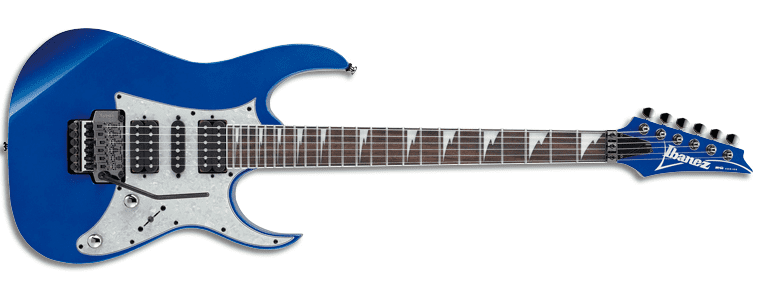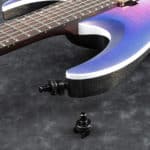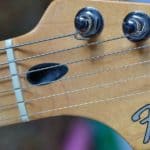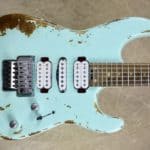Chances are you’re in the market for a superstrat. You have been browsing your options and these two Ibanez models stuck with you.
First of all, congratulations, you’re about to make a great choice. Both of these instruments are great pieces of gear.
But, you might be wondering, what are their differences and which one is better for you?
We’re here to help you out
If you just want the quick version of this all, here it is:
The main differences between the Ibanez RG350DX vs RG450DX are not within these two models but with the periods they were made. These differences mostly are represented by their pickups and bridges. The player’s consensus is that the RG450DX (2013–2014) is the better instrument due to its Edge Zero II tremolo.
In this article, we will define the main characteristics of each model, then we will put them side by side, compare them and talk about their differences. Finally, we will give you some advice on which one you should pick.
Let’s get started!
What does DX stand for in Ibanez guitars?
DX is a suffix that Ibanez incorporates into many of their models. It stands for “Deluxe” and it means that the finish of these guitars has some extra aesthetic features.
For example, DX models may include bindings and special inlays that won’t be found in a different suffixed model.
Ibanez RG350DX main characteristics

The Ibanez RG350DX was introduced in 1998 and it basically replaced the old RG450DX version.
Yes, as you will start to learn, if you didn’t know it by now, Ibanez models and their names are a complete mess. They come in and out of productions with substantial changes, and many are repeated within different periods of time.
This as all the RG model guitars is a superstrat with all that makes a superstrat shine: A tremolo system and a mix of humbuckers and a single-coil.
As for this model’s specs, they are different by periods but here are the most important ones:
| Spec | RG350DX (1998–2001) | RG350DX (2003–2004) | RG350DX (2005–2010) |
| Body material | Basswood | Basswood | Basswood |
| Neck Joint | Bolt-on, AANJ | Bolt-on, AANJ | Bolt-on, AANJ |
| Bridge | Lo TRS II | Edge Pro II | Edge III |
| Neck material | 1-piece maple | 1-piece maple | 3-piece maple |
| Neck type | Wizard II | Wizard II | Wizard II |
| Fingerboard material | Rosewood | Rosewood | Rosewood |
| Frets | 24 | 24 | 24 |
| Pickups | Powersounds | Powersounds | Infinity |
| Made in | Korea | Korea | Indonesia |
Ibanez RG450DX main characteristics

The Ibanez RG450DX model was firstly introduced in 1994 and its first series lasted until 1997, when as we said earlier was replaced by the RG350DX.
This particular model was not again in production until 2013 when it had a short run, with completely new specs for just a year.
In 2015, and with a new configuration it was continued at least until this article was written. But with Ibanez, you never know what might happen tomorrow.
We will try our best to showcase this guitar’s main features:
| Spec | RG450DX(1994–1997) | RG450DX(2013–2014) | RG450DX(2015–Now) |
| Body material | Basswood | Basswood | 2015–2018: Mahogany2019–Now: Meranti |
| Neck Joint | Bolt-on, AANJ | Bolt-on, AANJ | Bolt-on, AANJ |
| Bridge | Lo TRS II | Edge Zero II tremolo | Standard DL tremolo |
| Neck material | 1-piece maple | 3-piece maple | 1-piece maple |
| Neck type | Wizard II | Wizard III | Wizard III |
| Fingerboard material | Rosewood | Rosewood | 2015–2017: Rosewood2018–Now: Jatoba |
| Frets | 24 | 24 | 24 |
| Pickups | Infinity | Infinity | Quantum |
| Made in | Korea | Indonesia | Indonesia |
Differences between the Ibanez RG350DX vs RG450DX
As you could’ve seen the differences are very few between these 2 models, and they much depend on which years you’re comparing between.
The table below compares all the documented series of these guitars, we will write in bold what we consider the main differences:
| Spec | RG350DX (1998–2001) | RG350DX (2003–2004) | RG350DX (2005–2010) | RG450DX (1994–1997) | RG450DX (2013–2014) | RG450DX (2015–Now) |
| Body material | Basswood | Basswood | Basswood | Basswood | Basswood | 2015–2018: Mahogany 2019–Now: Meranti |
| Neck Joint | Bolt-on, AANJ | Bolt-on, AANJ | Bolt-on, AANJ | Bolt-on, AANJ | Bolt-on, AANJ | Bolt-on, AANJ |
| Bridge | Lo TRS II | Edge Pro II | Edge III | Lo TRS II | Edge Zero II tremolo | Standard DL tremolo |
| Neck material | 1-piece maple | 1-piece maple | 3-piece maple | 1-piece maple | 3-piece maple | 1-piece maple |
| Neck type | Wizard II | Wizard II | Wizard II | Wizard II | Wizard III | Wizard III |
| Fingerboard material | Rosewood | Rosewood | Rosewood | Rosewood | Rosewood | 2015–2017: Rosewood 2018–Now: Jatoba |
| Frets | 24 | 24 | 24 | 24 | 24 | 24 |
| Pickups | Powersounds | Powersounds | Infinity | Infinity | Infinity | Quantum |
| Made in | Korea | Korea | Indonesia | Korea | Indonesia | Indonesia |
If there’s already smoke coming from your brains, let us help you out next with what we could gather.
Which one should you choose?
Given that the differences are very small and mostly in bridges and pickups, what most Ibanez players recommend is deciding based on the bridge.
The rule of thumb is that the Edge Zero II is the better tremolo. However, the Edge 3 can be replaced with an original Floyd Rose.
The Standard DL tremolo is considered not to be as good.
It all will depend, in that case, if you’re looking for a guitar as a base for modifications or if you want to get an instrument that will remain final.
For a modding project, any of these guitars will work out. If this is your choice we’d recommend getting a 1-piece neck one, since the woods are the only thing you couldn’t tinker with, without replacing body parts.
For a guitar that will remain untouched, the RG450DX (2013–2014) seems like the safer bet given that it comes with the Edge Zero II bridge, although it has a 3-piece neck.
As a final note, we recommend you decide with your wallet. The quality of these instruments is very similar and if you’re looking for a superstrat you will be alright with any of these 2 model variations.
Pick for the better preserved and cheaper one you can find.

Hello there, my name is Ramiro and I’ve been playing guitar for almost 20 years. I’m obsessed with everything gear-related and I thought it might be worth sharing it. From guitars, pedals, amps, and synths to studio gear and production tips, I hope you find what I post here useful, and I’ll try my best to keep it entertaining also.





